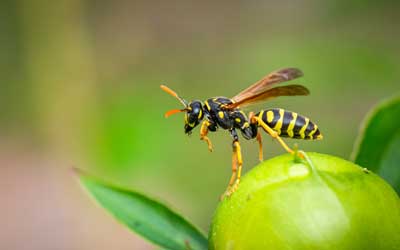They say hindsight is 20/20, but when it comes to protecting your family and home against pests this year, you can be proactive with the help of Rentokil. We are helping homeowners prepare for the upcoming pest season by offering insight into anticipated pest activity.
The experts at Rentokil have examined trends, used our company data and our field experiences and to determine the following six pest predictions. We are also offering preventative tips to help keep your home pest-free this year.
Mosquitoes
In some Western states, disease-spreading mosquitoes, such as the yellow fever mosquito and the Asian tiger mosquito, have surged in recent years. These mosquitoes, as well as the common house mosquito, can spread diseases such as the Zika virus, West Nile virus, and Eastern Equine Encephalitis (EEE). A bite from a mosquito can also spread the parasite that causes heartworm in pets.
Homeowner Tips: The risk of mosquito-borne diseases, such as the West Nile virus can increase with rising populations. Mosquitoes only need one tablespoon of water to lay their eggs. To protect yourself and your family, dispose of standing water from your property and always wear an EPA-approved insect repellent when spending time outdoors.
Over the past several years, rat populations have increased and this may be partly attributed to warmer than normal winters. We can expect to see that trend continue as rodent populations in suburban areas increase this year. Warmer winters, a booming construction pipeline, lack of sanitation control, and lack of affordable housing are all issues that have advanced the swell of recent rat activity.
Homeowner Tips: Rats spread disease and can be extremely destructive to homes. To prevent rodents, try the following rodent control tips: Keep trees and shrubs cut back, especially thick low-vegetation that can serve as good hiding places for rats. Make sure that trees do not overhang onto the roofline. Seal any exterior openings larger than a nickel with rodent-proof material such as hardware cloth or flashing. Finally, seal and tie trash bags, placing them into garbage cans with tight-fitting lids.
Termites
Termites cause homeowners in the United States $6 billion in property damages each year and are one of the most destructive pests. These wood-destroying pests are a continual problem for homeowners in the Western U.S., and this year, termites could prove to be even more damaging. The experts at Rentokil have seen an increase in activity from subterranean and dampwood termites in many areas this year.
Homeowner Tips: Earth-to-wood contact provides an avenue for termites to enter your home. To prevent termites, eliminate soil to wood contact and avoid moisture build-up near your homes’ foundation. Remove excess wood (stumps, lumber, etc.) from your yard. Termites can be present for years before homeowners ever see signs of their activity, causing considerable and costly damage. Avoid these costs by having a termite protection plan in place. Speak to your pest control provider about risk and protection options for your home.
Cockroaches
In the last several years, cockroach populations have increased dramatically, due in large part to warmer weather and increased rainfall. Cockroaches carry diseases, infest and contaminate stored food, and then spread bacteria through their excrement. Cockroach removal is critical as infestations can become serious if not taken care of in a timely manner.
Homeowner Tips: Cockroaches are not just a nuisance, they can make children sick. The presence of cockroaches increases the symptoms of asthma and allergies. To prevent an infestation, cockroach-proof your home by sealing small cracks and crevices around windows and door frames with a silicone-based caulk. Keep a clean kitchen, sweeping, mopping and wiping up any spills. If you’re experiencing cockroach problems, speak with your pest control professional to determine the best solution for your home.
Flies
If you have noticed more flies this past year, you are not alone. Although they’re more active in the summer, house flies reproduce year-round. Filth flies – house flies, bottle flies, flesh flies – generally live and breed near human habitats and their numbers have increased in recent years. Increasing population density, waste management practices that haven’t kept pace with growth, and a general trend toward a warming climate for the fly pressure all contribute to increasing this disease-spreading insect.
Homeowner Tips: House flies and “filth flies” are attracted to filth, and have the potential to harm humans and animals. Keeping a clean home is the first step to protecting yourself and your family. Keep trash closed in lidded containers and take it out often. Clean spills quickly and cover any non-refrigerated foods. Keep pet feeding and litter areas clean and fix drips and eliminate any areas of excess moisture.
Spiders
Spiders are carnivores, eating other insects and thriving in wet environments. Increased moisture leads to an increase in the insects that spiders eat as a food resource. Heavy rain and warmer temperatures have created the perfect conditions for insects and spiders to flourish. Although beneficial for our ecosystem, most people prefer spiders to stay outside where they belong.
Homeowner Tips: To keep spiders out of your home, keep food put away in tightly sealed storage containers. This will help eliminate ants, roaches and other pests, which will leave spiders with no food source. If the thought of spiders lurking is alarming, try changing your white outdoor light bulbs to yellow light bulbs, which attract fewer insects that can serve as food for the spiders. There are a few species of spiders that can live indoors and need to be controlled by spider removal experts.
The experts at Rentokil agree that a proactive approach is the first step any homeowner can take to prevent pest problems. With these pest predictions in mind, take time to evaluate your current pest control plan and make sure that you have the protection you need to protect yourself and your family from pests this year.
 As the weather warms up, people are starting to spend more and more time outside. As the world around us seems to come back to life, so do the throngs of pests that have been laying low all winter. All sorts of pests live around Northern UT and Southern ID, so it’s important to learn how to keep your home protected from all of them.
As the weather warms up, people are starting to spend more and more time outside. As the world around us seems to come back to life, so do the throngs of pests that have been laying low all winter. All sorts of pests live around Northern UT and Southern ID, so it’s important to learn how to keep your home protected from all of them. 

 Many of us have pulled out holiday decorations or old photo albums from our garages only to be met with evidence of pests. Spiders, rodents, and silverfish are some of the most common pests that infest garages, but why? Your garage is in fact a haven for pests with its dark corners and endless food supplies. In order to keep pests away from your garage, it’s important to learn how to make it less inhabitable in the first place. The team at Rentokil is here with their top tips for achieving a pest-free garage year-round.
Many of us have pulled out holiday decorations or old photo albums from our garages only to be met with evidence of pests. Spiders, rodents, and silverfish are some of the most common pests that infest garages, but why? Your garage is in fact a haven for pests with its dark corners and endless food supplies. In order to keep pests away from your garage, it’s important to learn how to make it less inhabitable in the first place. The team at Rentokil is here with their top tips for achieving a pest-free garage year-round. This year, families are likely spending more time in their backyards than ever. Spending more time outside means more encounters with insects and pests. While most pests are just a fact of life outside, no one wants them invading their outdoor living space. At Rentokil, we know that pests in your backyard are less than ideal. For this reason, we’ve gathered our top tips and tricks to make your yard less attractive to pests in general. Keep reading to learn how to get bug-free outdoor living.
This year, families are likely spending more time in their backyards than ever. Spending more time outside means more encounters with insects and pests. While most pests are just a fact of life outside, no one wants them invading their outdoor living space. At Rentokil, we know that pests in your backyard are less than ideal. For this reason, we’ve gathered our top tips and tricks to make your yard less attractive to pests in general. Keep reading to learn how to get bug-free outdoor living.
